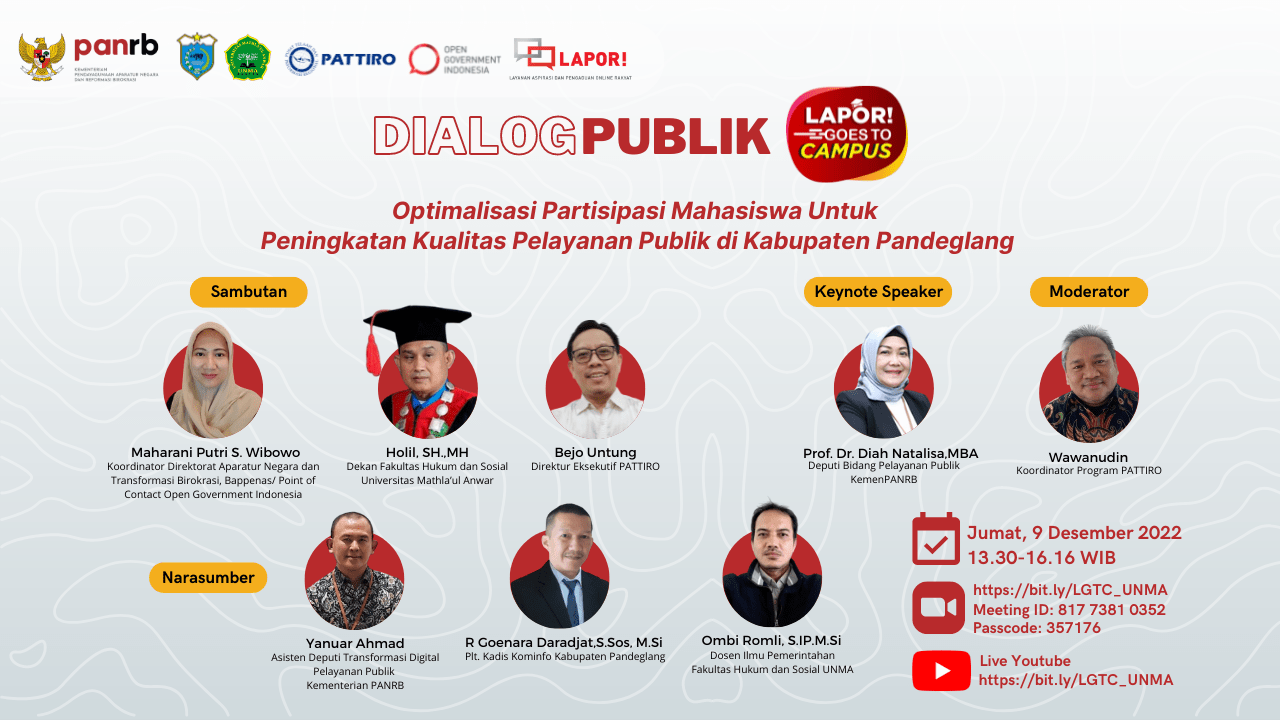
People have the right to get guarantees for quality public services, non-discriminatory, and in accordance with applicable standards. Certainty in public services will further increase public trust in the government. This was raised at the LAPOR! Goes to Campus Online, Pandeglang Regency, organized by PATTIRO in collaboration with the Ministry of Administrative and Bureaucratic Reform of the Republic of Indonesia (KemenPANRB) and UNMA on Friday, 9 December 2022.
Lecturer in Government Science at the Faculty of Law and Social Affairs, Mathla’ul Anwar University (UNMA), Ombi Romli, gave an example of the importance of certainty in health services “When there is certainty in administering medicine in health services, patients do not have to wait for hours to get the medicine. This increases public trust in public services.”
Certainty in implementation of public service can be done by responding to the aspirations of the people conveyed through the public service complaint channel. “Complain handling is a community right in the public space participation. This is a form of oversight in an effort to build public trust in the government,” said the Deputy for Public Services of KemenPAN RB, Diah Natalisa.
According to the Secretary of the Pandeglang Informatics, Encryption and Statistics Communication Service (Diskomsantik), Samsam Setyamulya, complaint management is important because it involves three things: the civil rights as recipients of public services, evaluation of the government, and clarification of complaints from the public to the government as a public service provider. In facts, people are often reluctant to complain about their dissatisfaction with public services because they do not trust that these complaints will be responded to and resolved by service providers.
Meanwhile, the government has opened up space for public participation as a form of oversight in an effort to build public trust. One form of community involvement in the government system is by utilizing a complaint canal system related to public services. Indonesia already has a complaint channel system in the form of SP4N-LAPOR!. It is hoped that the public can take advantage of SP4N-LAPOR! to provide constructive input to the government regarding public services.
Based on the data listed in site lapor.go.id/, the number of agencies connected to SP4N-LAPOR! as many as 658 agencies consisting of 34 ministries, 100 institutions, 34 Provinces, 396 Regencies and 94 Cities. “From these agencies that have been connected, only about 122 agencies or 19% have been declared good because they have completed follow-up on complaint reports above 50%,” said Coordinator of the Directorate of State Apparatus and Bureaucratic Transformation of Bappenas, Maharani Putri S. Wibowo.
SP4N-LAPOR! keep trying to develop to be better. Currently, the complaint channel through social media is still under development. This development can also be used as an arena to open up collaboration between the government and other stakeholders, such as academics. “At this moment, of course, we can also expand collaboration not only between the government and civil society groups, but also academics,” said Bejo Untung.





